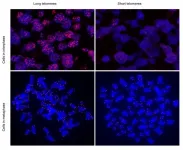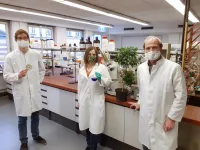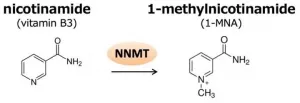(Press-News.org) Diets rich in healthy and plant-based foods encourages the presence of gut microbes that are linked to a lower risk of common illnesses including heart disease, research has found.
A large-scale international study using metagenomics and blood chemical profiling has uncovered a panel of 15 gut microbes associated with lower risks of common conditions such as obesity and type 2 diabetes. The study has been published today in Nature Medicine from researchers at King's College London, Massachusetts General Hospital (MGH), Harvard T.H. Chan School of Public Health, the University of Trento, Italy, and health start-up company ZOE.
The PREDICT 1 (Personalized Responses to Dietary Composition Trial 1) analyzed detailed data on the composition of participants' gut microbiomes, their dietary habits, and cardiometabolic blood biomarkers. It uncovered strong links between a person's diet, the microbes in their gut (microbiome) and their health.
Researchers identified microbes that positively or negatively correlate 'good' and 'bad' with an individual's risk of certain serious conditions such as diabetes, heart disease and obesity. Surprisingly, the microbiome has a greater association to these markers than other factors, such as genetics. Some of the identified microbes are so novel that they have not yet been named.
The researchers defined a "healthy" diet as one that contained a mix of foods associated with a lower risk of chronic disease. They found that trial subjects who ate such a diet, or one rich in plants, were more likely to have high levels of specific 'good' gut microbes which are associated with a low risk of common illnesses. The researchers also found microbiome-based biomarkers of obesity as well as markers for cardiovascular disease and impaired glucose tolerance, which are key risk factors for COVID. These findings can be used to help create personalized eating plans designed specifically to improve one's health.
Dr. Sarah Berry, Reader in Nutrition Sciences at King's College London said, "As a nutritional scientist, finding novel microbes that are linked to specific foods, as well as metabolic health, is exciting. Given the highly personalised composition of each individuals' microbiome, our research suggests that we may be able to modify our gut microbiome to optimize our health by choosing the best foods for our unique biology."
For example, the findings reveal that having a microbiome rich in Prevotella copri and Blastocystis species was associated with maintaining a favorable blood sugar level after a meal. Other species were linked to lower post-meal levels of blood fats and markers of inflammation.
Professor Tim Spector, Epidemiologist from King's College London, who started the PREDICT study program and is scientific founder of ZO, said: "When you eat, you're not just nourishing your body, you're feeding the trillions of microbes that live inside your gut."
Nicola Segata, PhD, professor and principal investigator of the Computational Metagenomics Lab at the University of Trento, Italy and leader of the microbiome analysis in the study, said: "We were surprised to see such large, clear groups of what we informally call 'good' and 'bad' microbes emerging from our analysis. It is also exciting to see that microbiologists know so little about many of these microbes that they are not even named yet. This is now a big area of focus for us, as we believe they may open new insights in the future into how we could use the gut microbiome as a modifiable target to improve human metabolism and health."
PREDICT is the largest in-depth nutritional study in the world. PREDICT 1 was an international collaboration to study links between diet, the microbiome, and biomarkers of cardiometabolic health. The researchers gathered microbiome sequence data, detailed long-term dietary information, and results of hundreds of cardiometabolic blood markers from just over 1,100 participants in the U.S. and the U.K. PREDICT 2 completed its primary investigations in 2020 with a further 1,000 U.S participants, and PREDICT 3 launched a few months ago.
INFORMATION:
With the Proof of Concept funding line, the ERC grants recipients of ERC frontier research funds (Starting, Consolidator, Advanced or Synergy grants) with 150.000 Euro to develop promising ideas with commercial or societal potential to the proof of concept stage. With this funding, Olaf Groß and his team in the Metabolism and Inflammation Group at the Institute of Neuropathology of the Medical Center - University of Freiburg will test whether a new class of immune activating drugs they discovered can boost the effectiveness of cancer immunotherapies ...
Heidelberg/Germany, 11 January 2021 - Development of an in vitro human-derived tissue model for studying virus infection and disease progression in the alveolar cells of the lungs responsible for oxygen and carbon dioxide exchange with the blood might enable the study of possible therapies for acute respiratory distress syndrome (ARDS) triggered by SARS-CoV-2. Researchers in the Netherlands have demonstrated that the SARS-CoV-2 replicates efficiently in their model resembling the human bronchioalveolar system that is thought to play a critical role in progression of infection towards pneumonia and ARDS.
It is already ...
Two billion years after the Big Bang, the Universe was still very young. However, thousands of huge galaxies, rich in stars and dust, were already formed. An international study, led by SISSA - Scuola Internazionale Superiore di Studi Avanzati, now explains how this was possible. Scientists combined observational and theoretical methods to identify the physical processes behind their evolution and, for the first time, found evidence for a rapid growth of dust due to a high concentration of metals in the distant Universe. The study, published in Astronomy&Astrophysics, offers a new approach to investigate the evolutionary phase of massive objects.
Since their initial discovery 20 years ago, very distant and massive galaxies that form prodigious amount of ...
Patients with severe COVID-19 disease have significantly shorter telomeres, according to a study conducted by researchers at the Spanish National Cancer Research Centre (CNIO) in collaboration with the COVID-IFEMA Field Hospital, published in the journal Aging. The study, led by Maria A. Blasco and whose first authors are Raúl Sánchez and Ana Guío-Carrión, postulates that telomere shortening as a consequence of the viral infection impedes tissue regeneration and that this is why a significant number of patients suffer prolonged sequelae.
Blasco was already developing a therapy to regenerate lung tissue in pulmonary fibrosis patients; she now believes that this treatment -which should still take at least a year and a half to become available- ...
NEW YORK, NY (Jan. 11, 2021)--A new study has found that up to 20% of glioblastomas--an aggressive brain cancer--are fueled by overactive mitochondria and may be treatable with drugs currently in clinical trials.
Mitochondria are responsible for creating the energy that fuels all cells. Though they are usually less efficient at producing energy in cancer, tumor cells in this newly identified type of glioblastoma rely on the extra energy provided by overactive mitochondria to survive.
The study, by cancer scientists at Columbia University's Vagelos College ...
For some years, an active substance from the leaves of an ornamental plant has been regarded as a possible forerunner of a new group of potent drugs. So far, however, it has been very laborious to manufacture it in large quantities. That could now change: Researchers at the University of Bonn (Germany) have identified a bacterium that produces the substance and can also be easily cultivated in the laboratory. The results are published in the journal Nature Communications.
The coralberry currently once again adorns many living rooms: In winter it bears bright red fruits, which make it a popular ornamental plant at this time of year. For pharmacists, however, it is interesting for a different reason: It contains ...
CHAMPAIGN, Ill. -- For years, researchers have worked to repurpose excess atmospheric carbon dioxide into new chemicals, fuels and other products traditionally made from hydrocarbons harvested from fossil fuels. The recent push to mitigate the climactic effects of greenhouse gases in the atmosphere has chemists on their toes to find the most efficient means possible. A new study introduces an electrochemical reaction, enhanced by polymers, to improve CO2-to-ethylene conversion efficiency over previous attempts.
The results of the study led by University of Illinois Urbana-Champaign chemistry ...
Metabolites are organic molecules that take part in or are created during the biochemical reactions constantly taking place in an organism. For the human body, more than 110,000 metabolites have been identified. Metabolites play a role in metabolic syndrome, which is the situation in which several medical conditions occur simultaneously; the conditions include obesity, high blood pressure and high blood sugar. Metabolic syndrome is associated with a higher risk of developing cardiovascular disease, type-2 diabetes and different kinds of cancer. The presence of certain metabolites can be an indicator for particular pathological ...
This most likely explains the augmented response of the immune system and the more severe disease progression. However, certain hypertension-reducing drugs known as ACE inhibitors can have a beneficial effect. They not only lower blood pressure, but also counteract immune hyperactivation. The scientists have now published their findings in the journal Nature Biotechnology.
More than one billion people worldwide suffer from high blood pressure, or hypertension. Of the more than 75 million people around the world who have become infected with the SARS-CoV-2 virus worldwide so far, more than 16 million also have hypertension. These patients are more likely to become severely ill, which in turn results in an increased ...
NEW YORK, NY (Jan. 11, 2021)--Thousands of different genetic mutations have been implicated in cancer, but a new analysis of almost 10,000 patients found that regardless of the cancer's origin, tumors could be stratified in only 112 subtypes and that, within each subtype, the Master Regulator proteins that control the cancer's transcriptional state were virtually identical, independent of the specific genetic mutations of each patient.
The study, published Jan. 11 in Cell, confirms that Master Regulators provide the molecular logic that integrates the effect ...



